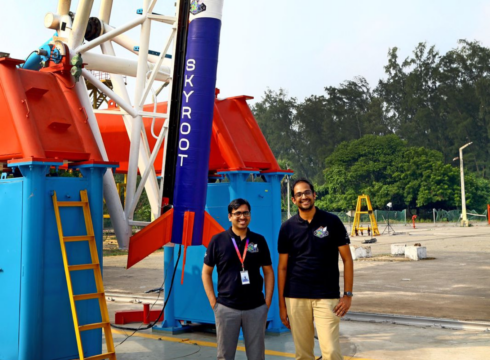Skyroot’s Vikram-S rocket was launched from the Satish Dhawan Space Centre in Sriharikota on Friday
The rocket is a single-stage solid fuelled, sub-orbital rocket developed by including carbon composite structures and 3D-printed components
Union MoS for Science and Technology Dr Jitendra Singh called the launch of the spacetech startup’s rocket a turning point in India’s startup movement
Inc42 Daily Brief
Stay Ahead With Daily News & Analysis on India’s Tech & Startup Economy
Hyderabad-based spacetech startup Skyroot Aerospace on Friday (November 18) became the first private Indian company to launch a rocket into space. The startup successfully launched its Vikram-S rocket from the Satish Dhawan Space Centre in Sriharikota.
The rocket is currently en route to Earth’s orbit, having lifted off successfully from Sriharikota into an overcast sky. Incidentally, the original launch window was between November 12 and 16, depending on the weather conditions.
Skyroot cofounder and CEO Pawan Kumar Chandana was the mission director for the historic launch.
“We are very excited to share that we scripted history today by successfully launching India’s first privately developed rocket Vikram-S. This mission has been executed in record time only because of the invaluable support we received from IN-SPACe and ISRO, and the technology talent that we inherently possess,” said Skyroot’s founders Chandana and Naga Bharath Daka on the launch.
The Indian National Space Promotion and Authorisation Centre (IN-SPACe), a single-window, independent, nodal agency which functions autonomously in the Department of Space, was set up by the Indian government to facilitate and promote the participation of the country’s private sector in the space segment.
The launch comes two months after Skyroot raised a $51 Mn funding round. The spacetech startup has raised a total funding of $67.3 Mn to date.
Prime Minister Narendra Modi was among those who applauded the rocket launch. “A historic moment for India as the rocket Vikram-S, developed by Skyroot Aerospace, took off from Sriharikota today! It is an important milestone in the journey of India’s private space industry,” he tweeted.
The accomplishment bears testimony to the immense talent of Indian youth, who took full advantage of the landmark space sector reforms of June 2020, added Modi.
Union Minister of State for Science and Technology Dr Jitendra Singh said, “It is a major step forward by India to developing its space ecosystem and to emerge as the leader in new space frontiers. This is indeed a turning point in India’s startup movement. My heartiest congratulations to Team Skyroot, ISRO and IN-SPACe for accomplishing this commendable feat in a reasonably short period of time.”
Vikram-S And India’s Spacetech Sector
The rocket Vikram-S is a single-stage solid fuelled, sub-orbital rocket developed by including carbon composite structures and 3D-printed components.
Equipped with a gross lift-off mass of 545 kg, and a payload mass of 80 kg, Vikram-S carried with it three customer payloads, which will map the measurement and validation of certain flight parameters and payload integration processes.
The rocket is 8 metres long and has a diameter of 0.37 metres. Vikram-S has a peak vacuum thrust of 71,000 kg and a peak velocity of Mach 5.
Skyroot has three different rockets in production, Vikram I, II and III. The startup claims that its rockets can be assembled and ready for launch within 24-72 hours, depending on the rocket and the size of the payload. The rockets can carry between 290 kg and 815 kg of payload, depending on the rocket’s size and the target orbit.
The Indian government opened the space sector for private companies in 2020 and has been encouraging and promoting startups in the space. This has seen startups such as Bellatrix Aerospace, Agnikul, Dhruva, and Astrogate participate in developing indigenous space equipment, including launch vehicles, satellites and more.
Skyroot’s rocket launch sets the precedent for more spacetech startups from the country to innovate and compete with global players such as SpaceX and Blue Origin, along with ISRO, to capture the $400 Bn global spacetech market.
As per an Inc42 analysis, the Indian commercial spacetech market will have an addressable market opportunity of $77 Bn by 2030. Around 100 Indian spacetech startups are working in the aerospace segment, with IN-SPACe as the regulator.
Note: We at Inc42 take our ethics very seriously. More information about it can be found here.


